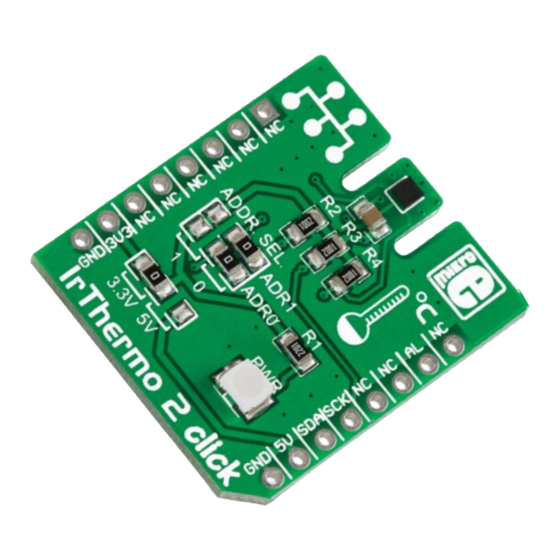
Table of Contents
Advertisement
Quick Links
IrThermo 2
click
1. Introduction
IrThermo 2 click carries the TMP007 infrared
thermopile sensor with an integrated
math engine. The measurement range
of the sensor is between –40°C to 125°C
(with a 14-bit resolution). IrThermo 2 click
communicates with the target board MCU
through mikroBUS
I
C pins (SCL, SDA);
™
2
there's also an Alert pin in place of the default
mikroBUS
INT. The board is designed to use
™
either a 3.3V or a 5V power supply.
2. Soldering the headers
Before using your click board
™
, make sure
to solder 1x8 male headers to both left and
right side of the board. Two 1x8 male headers
are included with the board in the package.
2
Turn the board upside down so that
the bottom side is facing you upwards.
Place shorter pins of the header into the
appropriate soldering pads.
1
3
Turn the board upward again. Make sure
to align the headers so that they are
perpendicular to the board, then solder the
pins carefully.
3. Plugging the board in
Once you have soldered the headers your
board is ready to be placed into the desired
mikroBUS
socket. Make sure to align the cut
™
in the lower-right part of the board with the
markings on the silkscreen at the mikroBUS
socket. If all the pins are aligned
correctly, push the board all
the way into the socket.
4. Essential features
IrThermo 2 click is a non-contact temperature
measurement solution, ideal for monitoring
hard to reach objects (too far, inconveniently
placed, hazardous, fluid etc.). The sensor
absorbs the infrared radiation emitted by
the target object (within the sensor's field
of view) and the integrated math engine
calculates its temperature by comparing it
with the temperature of the silicon die. The
sensor is factory calibrated, but the user can
adjust the calibration coefficients for specific
applications (to correct for range, field of view,
object shape and environmental factors).
click
BOARD
™
www.mikroe.com
™
IrThermo 2 click manual
ver 1.00
0 1 0 0 0 0 0 0 7 9 1 4 0
Advertisement
Table of Contents

Summary of Contents for mikroElektronika IrThermo 2 click
- Page 1 IrThermo 2 click 4. Essential features IrThermo 2 click is a non-contact temperature measurement solution, ideal for monitoring hard to reach objects (too far, inconveniently placed, hazardous, fluid etc.). The sensor absorbs the infrared radiation emitted by the target object (within the sensor’s field...
- Page 2 25.4 1000 WIDTH the present schematic are subject to change HEIGHT* IrThermo 2 click has two sets of jumpers. at any time without notice. ADDR. SEL. for specifying the I C address, 28.6 mm / 1125 mils and a jumper for switching between 3.3V Copyright ©...
















Need help?
Do you have a question about the IrThermo 2 click and is the answer not in the manual?
Questions and answers